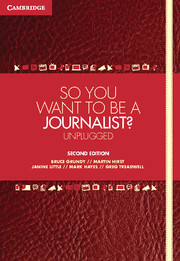Book contents
- Frontmatter
- Contents
- About the authors
- Preface to the second edition
- Acknowledgements
- Acknowledgements for the second edition
- Introduction Journalism unplugged
- Part 1 DISCOVERING JOURNALISM
- Part 2 FINDING AND UNDERSTANDING NEWS
- Part 3 NEWS-WRITING ACROSS THE GENRES
- Part 4 Legal and ethical issues
- 10 Journalism and the law
- 11 Dealing with defamation – everyone has the right to reputation
- 12 Some thoughts about ethics today
- 13 Regulating journalism
- 14 The meaning of professional in journalism
- References
- Index
10 - Journalism and the law
from Part 4 - Legal and ethical issues
Published online by Cambridge University Press: 05 October 2012
- Frontmatter
- Contents
- About the authors
- Preface to the second edition
- Acknowledgements
- Acknowledgements for the second edition
- Introduction Journalism unplugged
- Part 1 DISCOVERING JOURNALISM
- Part 2 FINDING AND UNDERSTANDING NEWS
- Part 3 NEWS-WRITING ACROSS THE GENRES
- Part 4 Legal and ethical issues
- 10 Journalism and the law
- 11 Dealing with defamation – everyone has the right to reputation
- 12 Some thoughts about ethics today
- 13 Regulating journalism
- 14 The meaning of professional in journalism
- References
- Index
Summary
Chapter objectives
Together with the next three chapters (on defamation, ethics and professionalism), this chapter will introduce you to the following:
The social, legal and ethical contexts in which journalists operate on a daily basis
How the legal system interacts with and impacts on journalism and the news
Common law as it applies to the work of journalists
How to deal with the court system
How to recognise and avoid contempt of court
We cannot go past the law, so it is important for you to understand the legal implications in any relationship between journalists and the people with whom they deal during the course of their work. This chapter is an introduction only; the law is complex, and so is the world of journalism and news. We recommend that you read a good book on journalism and law relevant to where you are going to work.
You can’t plead ignorance
Ignorance of the law does not excuse a person from criminal responsibility for an act that would otherwise be an offence …
Queensland Criminal Code, s 48(1)Words similar to those in Queensland’s Criminal Code operate or prevail in all jurisdictions. Ignorance of the law is no excuse. If it were, everyone could claim they didn’t know what they did was wrong and there would be no need for courts. It would probably be a pretty wild – even dangerous – place out there. Relying on what others say the law is – even those who should know – is no defence either. What this illustrates for the journalist, and everyone else, is simple: to do a professional job as a journalist, you have to know the law. And there is a great deal to know.
- Type
- Chapter
- Information
- So You Want To Be A Journalist?Unplugged, pp. 211 - 229Publisher: Cambridge University PressPrint publication year: 2012



